2020-2021高一英语必修一Unit 5 Languages around词汇练(原卷版)
- 格式:docx
- 大小:19.70 KB
- 文档页数:4
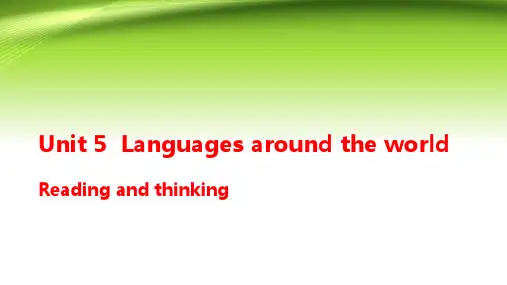
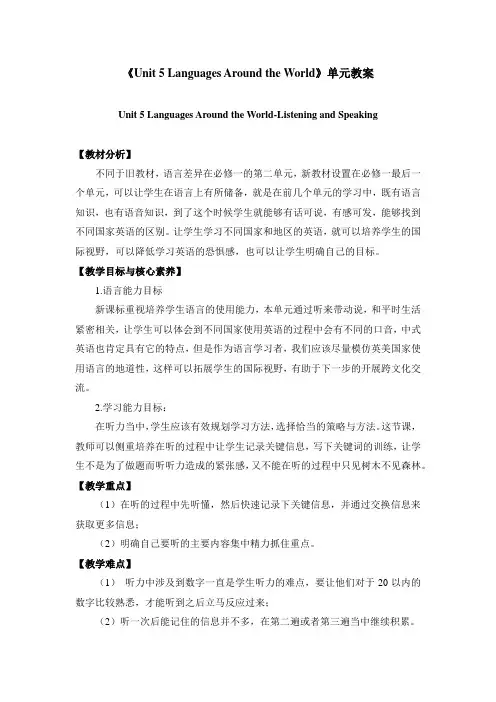
《Unit 5 Languages Around the World》单元教案Unit 5 Languages Around the World-Listening and Speaking【教材分析】不同于旧教材,语言差异在必修一的第二单元,新教材设置在必修一最后一个单元,可以让学生在语言上有所储备,就是在前几个单元的学习中,既有语言知识,也有语音知识,到了这个时候学生就能够有话可说,有感可发,能够找到不同国家英语的区别。
让学生学习不同国家和地区的英语,就可以培养学生的国际视野,可以降低学习英语的恐惧感,也可以让学生明确自己的目标。
【教学目标与核心素养】1.语言能力目标新课标重视培养学生语言的使用能力,本单元通过听来带动说,和平时生活紧密相关,让学生可以体会到不同国家使用英语的过程中会有不同的口音,中式英语也肯定具有它的特点,但是作为语言学习者,我们应该尽量模仿英美国家使用语言的地道性,这样可以拓展学生的国际视野,有助于下一步的开展跨文化交流。
2.学习能力目标:在听力当中,学生应该有效规划学习方法,选择恰当的策略与方法。
这节课,教师可以侧重培养在听的过程中让学生记录关键信息,写下关键词的训练,让学生不是为了做题而听听力造成的紧张感,又不能在听的过程中只见树木不见森林。
【教学重点】(1)在听的过程中先听懂,然后快速记录下关键信息,并通过交换信息来获取更多信息;(2)明确自己要听的主要内容集中精力抓住重点。
【教学难点】(1)听力中涉及到数字一直是学生听力的难点,要让他们对于20以内的数字比较熟悉,才能听到之后立马反应过来;(2)听一次后能记住的信息并不多,在第二遍或者第三遍当中继续积累。
【教学过程】Unit 5 Languages Around the World-Reading and Thinking【教材分析】本节课是高中英语第一册的最后一个单元的阅读和思考部分,文章难度明显增加,体现在以下几个方面:文章题材是说明文,比较难理解;话题生疏,涉及到历史等知识;生词量增大,而且在语境中理解词汇的要求提高。
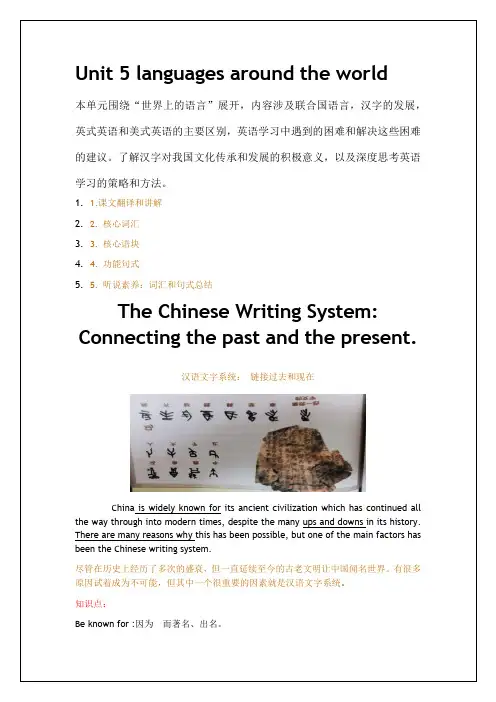
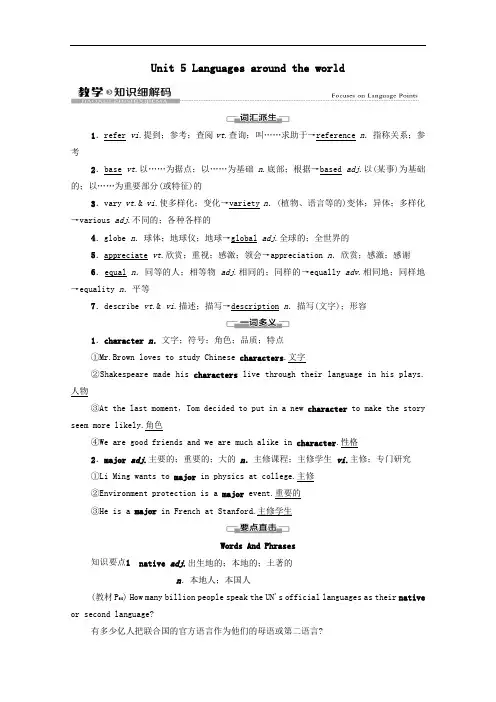
Unit 5 Languages around the world1.refer vi.提到;参考;查阅vt.查询;叫……求助于→reference n.指称关系;参考2.base vt.以……为据点;以……为基础n.底部;根据→based adj.以(某事)为基础的;以……为重要部分(或特征)的3.vary vt.& vi.使多样化;变化→variety n.(植物、语言等的)变体;异体;多样化→various adj.不同的;各种各样的4.globe n.球体;地球仪;地球→global adj.全球的;全世界的5.appreciate vt.欣赏;重视;感激;领会→appreciation n.欣赏;感激;感谢6.equal n.同等的人;相等物adj.相同的;同样的→equally adv.相同地;同样地→equality n.平等7.describe vt.& vi.描述;描写→description n.描写(文字);形容1.character n.文字;符号;角色;品质;特点①Mr.Brown loves to study Chinese characters.文字②Shakespeare made his characters live through their language in his plays.人物③At the last moment,Tom decided to put in a new character to make the story seem more likely.角色④We are good friends and we are much alike in character.性格2.major adj.主要的;重要的;大的n.主修课程;主修学生 vi.主修;专门研究①Li Ming wants to major in physics at college.主修②Environment protection is a major event.重要的③He is a major in French at Stanford.主修学生Words And Phrases知识要点1native adj.出生地的;本地的;土著的n.本地人;本国人(教材P60) How many billion people speak the UN's official languages as their native or second language?有多少亿人把联合国的官方语言作为他们的母语或第二语言?[例1] Native English speakers can understand each other even if they don't speak the same kind of English.以英语作为母语的人,即使他们所讲的语言不尽相同,但也可以相互理解。
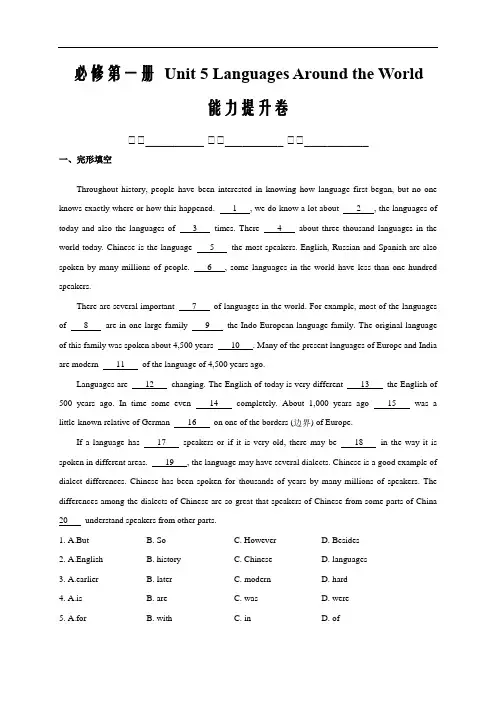
必修第一册Unit 5 Languages Around the World能力提升卷姓姓__________ 姓姓__________ 姓姓___________一、完形填空Throughout history, people have been interested in knowing how language first began, but no one knows exactly where or how this happened. 1 , we do know a lot about 2 , the languages of today and also the languages of 3 times. There 4 about three thousand languages in the world today. Chinese is the language 5 the most speakers. English, Russian and Spanish are also spoken by many millions of people. 6 , some languages in the world have less than one hundred speakers.There are several important 7 of languages in the world. For example, most of the languages of 8 are in one large family 9 the Indo-European language family. The original language of this family was spoken about 4,500 years 10 . Many of the present languages of Europe and India are modern 11 of the language of 4,500 years ago.Languages are 12 changing. The English of today is very different 13 the English of 500 years ago. In time some even 14 completely. About 1,000 years ago 15 was a little-known relative of German 16 on one of the borders (边界) of Europe.If a language has 17 speakers or if it is very old, there may be 18 in the way it is spoken in different areas. 19 , the language may have several dialects. Chinese is a good example of dialect differences. Chinese has been spoken for thousands of years by many millions of speakers. The differences among the dialects of Chinese are so great that speakers of Chinese from some parts of China 20 understand speakers from other parts.1. A.But B. So C. However D. Besides2. A.English B. history C. Chinese D. languages3. A.earlier B. later C. modern D. hard4. A.is B. are C. was D. were5. A.for B. with C. in D. of6. A.In a word B. On the one hand C. What’s more D. On the other hand7. A.forms B. systems C. families D. changes8. A.Europe B. Asia C. Africa D. America9. A.called B. spoken C. calling D. speaking10. A.before B. ago C. later D. old11. A.times B. families C. forms D. members12. A.always B. seldom C. often D. sometimes13. A.about B. with C. between D. from14. A.die out B. die away C. die down D. die off15. A.Spanish B. English C. Chinese D. Russian16. A.called B. told C. spoken D. named17. A.a great deal of B. a few C. a little D. a lot of18. A.speakers B. differences C. similarities D. changes19. A.That is B. Therefore C. In fact D. However20. A.mustn’t B. may not C. won’t D. can’t二、阅读理解AWhen we don't understand each other's language, we can talk with the help of signs. A Frenchman was once travelling in England. He could not speak English at all. One day he went into a restaurant and sat down at a table. When the waiter came, he opened his mouth, put his fingers in it, and took out again. He wanted to say. “Bring me something to eat.”The waiter soon brought him a cup of tea. The man moved his head from side to side. The waiter understood him and took the tea away. In a moment he came with a cup of coffee. But the man againrefused it. He shook his head whenever the waiter brought him something to drink, for drinks are not food. When the man was going away, another man came in. This man saw the waiter, and he put his hand on his stomach. That was enough. In a few minutes there was a large plate of meat and vegetables on the table in front of him.So you see, we cannot understand the language of signs as well as we can understand the language of words.21.According to the passage, when people do not understand each other's language, they can talk with the help of ________.A.a waiterB. a teacherC.an EnglishmanD. their hands, heads, and other parts of their bodies22. A Frenchman signed to the waiter ________.A. to give him some medicineB. to bring him a cup of coffeeC. to ask him for foodD. to tell him what he said23. Another man saw the waiter, and put his hand on his stomach. He meant ________.A. he had a stomachacheB. he was hungryC. he was very thirstyD. he was full24. From this story we know ________.A. people can only understand the language of wordsB. proper gestures can help to understand each otherC. waiters should understand body languagesD. it is important to learn foreign languagesBNowadays everybody seems to think that they know English. Many people speak it but few speak it really well. Practice is necessary in speaking English well.Reading is also one of the things that will help you to speak English better. Read whenever you can and whatever you like! Read papers and Internet sites that you like in English every day. Then, you will see that the number of known words is increasing and you are able to speak with more skills. Then you will have made the foundations and a good basis of English. It is not good to stop and get stuck there.Going to England or an Englishspeaking country is a good choice, but many people cannot afford it. If you cannot go, reading and speaking with your friends will also help you to practice your English. However, I think it is very good to visit some Englishspeaking country to see and test your knowledge in everyday life. You will understand the everyday usage of the language in its natural environment. There your level of English is going to improve even faster. Your ability to speak English is better. Nothing can match the excitement and happiness when a native speaker tells you that your English is very good!Finally, in order to speak English well, you must be persistent and do it every day. It is like playing the piano. Pianists play it every day and so should you. Include English in your life and you will see where it is going. Practice, Practice! Read, write and improve your language skills and you are on your way when you will be able to speak it with more and more confidence!25.Which of the following would be the best title for the passage?A.How to Improve Your Language SkillsB.Speaking EnglishC.How to Speak English WellD.Practice, Practice!26.What does the writer suggest about reading?A.Trying to improve your vocabulary.B.Keeping on reading when you have time.C.Stopping when you have a good basis of English.D.Looking up every unknown word when reading.27.The main idea of the last paragraph is that ________.A.we should play the piano every dayB.speaking English is fun and entertainingC.if we've learned to read and write, we'll certainly be able to speakD.we should practice English every day to improve our speaking skills28.According to the passage, what may make the author excited?A.Reading papers and Internet sites.B.Having a good basis of English.C.Going to an Englishspeaking country.D.A native speaker's praise.CI traveled to London, England in the spring of 2016. Actually, I traveled with CAPA International Education on a study program. At that time, I did a full threemonth program but I traveled on weekends and during breaks.I used to live in a small town outside New York. The idea of big cities has always excited me and I wanted to take advantage of that onceinalifetime opportunity. It was a great opportunity for me to see how independent I could be in another country, because I hope to travel a lot more in the future.I lived in a flat in Ealing Broadway with several other students from different American schools. The biggest surprise I found there was the culture shock I experienced. I had expected traveling to London to be an easy transition (转变) for me because I thought their culture was close to that of America. But you know the language and the people were greatly different from what I had expected. They had different accents. In fact, they were noisy and more freethinking than most Americans I knew.However, I tried to take part in their giant Chinese New Year celebration in Trafalgar Square. I went to several Jewish society holiday celebrations and actively participated in any cultural activities I knew at that time. It was great to be able to truly put myself in their culture. These are experiences I couldn't get anywhere else.I would suggest people hoping to follow in my footsteps not let anything hold them back from exploring the foreign cultures presented to them. Yes, you are there for school, but your number one priority (优先) is yourself. So make sure you go home with no regrets. Do not miss anything!29.What was the author's main purpose in going to London?A.To go sightseeing.B.To visit some relatives.C. To join in a study program.D. To experience the life in a big city.30. What did the author think of the opportunity of traveling to London?A. It would change his life.B. It would test his independence.C. It would make his dream come true.D. It would help improve his communication ability.31. What was beyond the author's expectation after arriving in London?A. Culture differences.B. Unfriendly students.C. His living conditions.D. Some strange accents.32. In the last paragraph, the author mainly advises people studying abroad to ________.A. explore more interesting places for travelingB. try to receive more international educationC. combine study with exploring foreign culturesD. look for more ways to deal with the culture shock三、七选五Simple ways to improve your written EnglishMany people think it is really difficult to improve (提高) their writing in English. Don't worry, though. Here are some simple steps that you can take to improve your written English.•Increase your vocabulary.To express yourself clearly, you need a good active vocabulary. That's not just being able to know lots of words — it means actually being able to use them correctly. __33 __Tip: When you learn a new word, try to learn all the forms of that word.•__34 __People often say that we learn to write best by reading. Reading in English is useful in many ways. It is a great way to get an idea of the different styles of writing and see how to use words properly.Tip: __35 __ Learning shouldn't be boring. Read each text several times to make sure you understand how to use new words and expressions in the text.•Improve your grammar.Grammar is very important because it improves the quality (质量) of your writing.Tip: __36 __ The first time, look for general mistakes and the second time look for mistakes with the grammar point you are studying at the moment.•Just do it!The best way to improve your writing is to get a pen and paper and write. Be prepared to write several versions (版本) of each text.__37 __A.Know your readers.B.Read widely and often.C.Always check your writing twice.D.Remember, practice makes perfect!E.Choose books or articles that interest you.e simpler language and shorter sentences to show your ideas.G.Do this by learning new words with example sentences, not just word lists.四、语法填空阅读下面短文,在空白处填入1个适当的单词或括号内单词的正确形式。

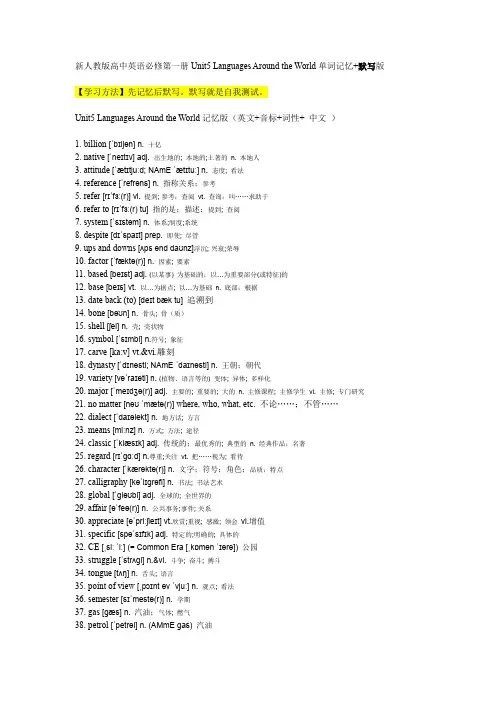
新人教版高中英语必修第一册Unit5 Languages Around the World单词记忆+默写版【学习方法】先记忆后默写。
默写就是自我测试。
Unit5 Languages Around the World记忆版(英文+音标+词性+ 中文)1. billion [ˈbɪljən] n. 十亿2. native [ˈneɪtɪv] adj. 出生地的; 本地的;土著的n. 本地人3. attitude [ˈætɪtjuːd; NAmE ˈætɪtuː] n. 态度; 看法4. reference [ˈrefrəns] n. 指称关系;参考5. refer [rɪˈfɜː(r)] vi.提到; 参考;查阅vt. 查询;叫……求助于6. refer to [rɪˈfɜː(r) tu]指的是;描述;提到; 查阅7. system [ˈsɪstəm] n. 体系;制度;系统8. despite [dɪˈspaɪt] prep. 即使; 尽管9. ups and downs [ʌps ənd daʊnz]浮沉; 兴衰;荣辱10. factor [ˈfæktə(r)] n. 因素; 要素11. based [beɪst] adj. (以某事) 为基础的;以…为重要部分(或特征)的12. base [beɪs] vt. 以…为据点; 以…为基础n. 底部;根据13. date back (to) [deɪt bæk tu] 追溯到14. bone [bəʊn] n. 骨头; 骨(质)15. shell [ʃel] n. 壳; 壳状物16. symbol [ˈsɪmbl] n.符号; 象征17. carve [ka:v] vt.&vi.雕刻18. dynasty [ˈdɪnəsti; NAmE ˈdaɪnəsti] n. 王朝;朝代19. variety [vəˈraɪəti] n. (植物、语言等的) 变体; 异体; 多样化20. major [ˈmeɪdʒə(r)] adj. 主要的; 重要的; 大的n. 主修课程; 主修学生vi. 主修; 专门研究21. no matter [nəʊˈmætə(r)] where, who, what, etc. 不论……;不管……22. dialect [ˈdaɪəlekt] n. 地方话; 方言23. means[miːnz] n. 方式; 方法; 途径24. classic [ˈklæsɪk] adj. 传统的;最优秀的; 典型的n. 经典作品;名著25. regard [rɪˈɡɑːd] n.尊重;关注vt. 把……视为; 看待26. character [ˈkærəktə(r)] n. 文字;符号;角色;品质;特点27. calligraphy [kəˈlɪɡrəfi] n. 书法; 书法艺术28. global [ˈɡləʊbl] adj. 全球的; 全世界的29. affair [əˈfeə(r)] n. 公共事务;事件; 关系30. appreciate [əˈpriːʃieɪt] vt.欣赏;重视; 感激; 领会vi.增值31. specific [spəˈsɪfɪk] adj. 特定的;明确的; 具体的32. CE [ˌsiː ˈiː] (= Common Era [ˌkɒmən ˈɪərə]) 公园33. struggle [ˈstrʌɡl] n.&vi. 斗争; 奋斗; 搏斗34. tongue [tʌŋ] n. 舌头; 语言35. point of view [ˌpɔɪnt əv ˈvjuː] n. 观点; 看法36. semester [sɪˈmestə(r)] n. 学期37. gas [ɡæs] n. 汽油;气体; 燃气38. petrol [ˈpetrəl] n. (AMmE gas) 汽油39. subway [ˈsʌbweɪ] n. (BrE underground [ˌʌndəˈɡraʊnd]) 地铁40. apartment [əˈpɑːtmənt] n. 公寓套房41. pants [pænts] n. [pl.] (BrE) 内裤; 短裤42. beg [beg] vt. 恳求; 祈求; 哀求43. equal [ˈiːkwəl] n. 同等的人; 相等物adj. 相同的,同样的44. gap [ɡæp] n. 间隔;开口; 差距45. demand [dɪˈmɑːnd] n. 要求; 需求vt. 强烈要求; 需要vi. 查问46. vocabulary [vəˈkæbjələri; vəˈkæbjəleri] n. 词汇47. description [dɪˈskrɪpʃn] n. 描写(文字); 形容48. relate [rɪˈleɪt] vt. 联系; 讲述49. relate to [rɪˈleɪt tu] 与……相关;涉及;谈到新人教版高中英语必修第一册Unit5 Languages Around the World单词默写版【学习方法】先记忆后默写。
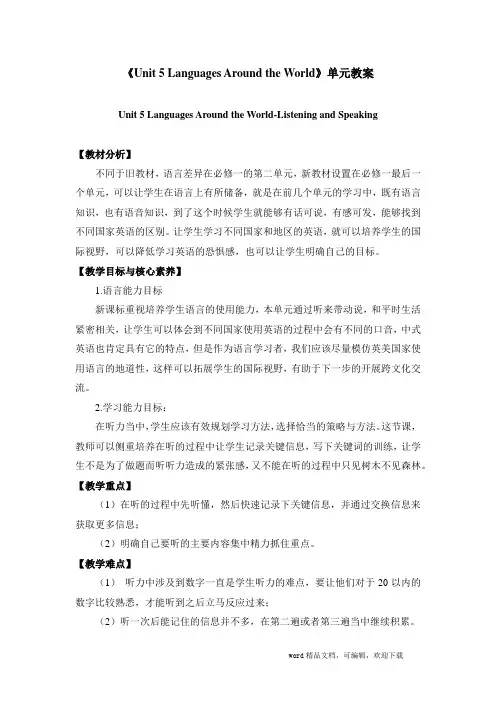
《Unit 5 Languages Around the World》单元教案Unit 5 Languages Around the World-Listening and Speaking【教材分析】不同于旧教材,语言差异在必修一的第二单元,新教材设置在必修一最后一个单元,可以让学生在语言上有所储备,就是在前几个单元的学习中,既有语言知识,也有语音知识,到了这个时候学生就能够有话可说,有感可发,能够找到不同国家英语的区别。
让学生学习不同国家和地区的英语,就可以培养学生的国际视野,可以降低学习英语的恐惧感,也可以让学生明确自己的目标。
【教学目标与核心素养】1.语言能力目标新课标重视培养学生语言的使用能力,本单元通过听来带动说,和平时生活紧密相关,让学生可以体会到不同国家使用英语的过程中会有不同的口音,中式英语也肯定具有它的特点,但是作为语言学习者,我们应该尽量模仿英美国家使用语言的地道性,这样可以拓展学生的国际视野,有助于下一步的开展跨文化交流。
2.学习能力目标:在听力当中,学生应该有效规划学习方法,选择恰当的策略与方法。
这节课,教师可以侧重培养在听的过程中让学生记录关键信息,写下关键词的训练,让学生不是为了做题而听听力造成的紧张感,又不能在听的过程中只见树木不见森林。
【教学重点】(1)在听的过程中先听懂,然后快速记录下关键信息,并通过交换信息来获取更多信息;(2)明确自己要听的主要内容集中精力抓住重点。
【教学难点】(1)听力中涉及到数字一直是学生听力的难点,要让他们对于20以内的数字比较熟悉,才能听到之后立马反应过来;(2)听一次后能记住的信息并不多,在第二遍或者第三遍当中继续积累。
【教学过程】Unit 5 Languages Around the World-Reading and Thinking【教材分析】本节课是高中英语第一册的最后一个单元的阅读和思考部分,文章难度明显增加,体现在以下几个方面:文章题材是说明文,比较难理解;话题生疏,涉及到历史等知识;生词量增大,而且在语境中理解词汇的要求提高。
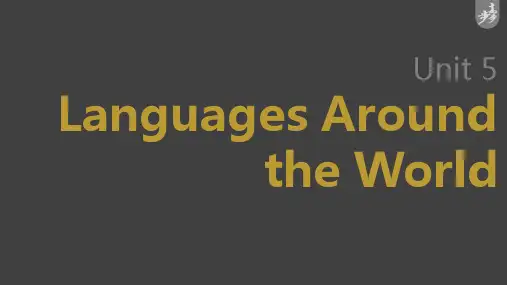

『高一教材·同步双测』『A卷基础篇』『B卷提升篇』试题汇编前言:本试题选于近一年的期中、期末、中考真题以及经典题型,精选精解精析,旨在抛砖引玉,举一反三,突出培养能力,体现研究性学习的新课改要求,实现学生巩固基础知识与提高解题能力的双基目的。
(1)A卷注重基础,强调基础知识的识记和运用;(2)B卷强调能力,注重解题能力的培养和提高;(3)单元测试AB卷,期中、期末测试。
构成立体网络,多层次多角度为考生提供检测,查缺补漏,便于寻找知识盲点或误区,不断提升。
祝大家掌握更加牢靠的知识点,胸有成竹从容考试!Unit5 Languages around the world测试卷(B卷提升篇)【人教版】学校:__________班级:__________姓名:_________ 考号:___________温馨提示:本试卷共分第Ⅰ卷和第Ⅱ卷两部分,第Ⅰ卷为选择题;第Ⅱ卷为非选择题;满分为120分,考试时间为100分钟。
请同学们将答案写在答题卡上,务必注意你的书写。
第Ⅰ卷第一部分阅读理解(共两节,满分50分)第一节(共15题;每小题2.5分,满分37.5分)阅读下列短文,从每题所给的四个选项(A、B、C和D)中,选出最佳选项,并在答题卡上将该项涂黑。
A(黑龙江大庆中学2019-2020 5月模拟)Ideally situated San Antonio Hotel+Spa is only 150 meters away from thebeautiful Qawra Promenade. This newly redecorated hotel offers an extensive rangeof modern facilities, entertainment and animation programs and enjoys its ownconcession(特许经营权) on the nearby beach. It’s an ideal choice for those seeking torelax and enjoy the best of what Malta has to offer.AccommodationSan Antonio Hotel+Spa offers big,modern rooms all with a balcony.Interconnecting rooms and disabled access rooms are available upon request. All theguest rooms are well equipped with heating and air conditioning,a private bathroomwith a hair dryer,a telephone,a satellite TV,a mini-fridge,tea and coffee makingfacilities,free Wi-Fi,and a ceiling fan.Facilities2 pools—an indoor pool(with a baby pool)and an outdoor poolA health club including the fully-equipped gym, aerobic studio, steam bath, saunas and JacuzziPrivate underground parkingShops, restaurants and bars(the mini bar only opens on request)Meals &DrinksThree meals a day, with lunch/dinner including house wine/beer, soft drinks, mineral waterTea, coffee, soft drinks, local fruit juices, water, house beer/spirits, cocktailsAttention: Now a FREE room upgrade is provided; an upgrade is valid on inland and pool view rooms. A free upgrade to the next room category depends on availability and can be withdrawn at any time. The offer is valid on new bookings made between June 22 and July 1 with travel dates within July 1 to October 31(staying for a minimum of 5 nights).1. What is the most typical feature of the hotel?A. Traditional.B. Kid-centered.C. Disabled-accessible.D. Well-equipped.【答案】D【解析】推理判断题.根据第一段信息“This newly redecorated hotel offers an extensive ran ge of modern facilities, entertainment and animation programs…”可知这是一家新装修的现代化旅馆,故判断旅馆的设备很好。
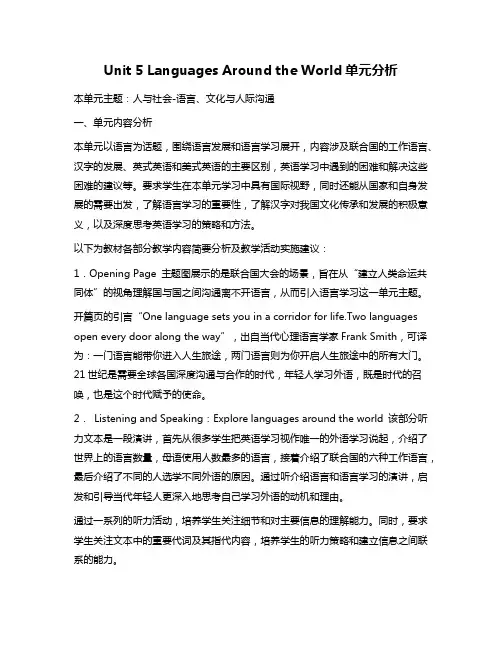
Unit 5 Languages Around the World单元分析本单元主题:人与社会-语言、文化与人际沟通一、单元内容分析本单元以语言为话题,围绕语言发展和语言学习展开,内容涉及联合国的工作语言、汉字的发展、英式英语和美式英语的主要区别,英语学习中遇到的困难和解决这些困难的建议等。
要求学生在本单元学习中具有国际视野,同时还能从国家和自身发展的需要出发,了解语言学习的重要性,了解汉字对我国文化传承和发展的积极意义,以及深度思考英语学习的策略和方法。
以下为教材各部分教学内容简要分析及教学活动实施建议:1.Opening Page 主题图展示的是联合国大会的场景,旨在从“建立人类命运共同体”的视角理解国与国之间沟通离不开语言,从而引入语言学习这一单元主题。
开篇页的引言“One language sets you in a corridor for life.Two languages open every door along the way”,出自当代心理语言学家Frank Smith,可译为:一门语言能带你进入人生旅途,两门语言则为你开启人生旅途中的所有大门。
21世纪是需要全球各国深度沟通与合作的时代,年轻人学习外语,既是时代的召唤,也是这个时代赋予的使命。
2.Listening and Speaking:Explore languages around the world 该部分听力文本是一段演讲,首先从很多学生把英语学习视作唯一的外语学习说起,介绍了世界上的语言数量,母语使用人数最多的语言,接着介绍了联合国的六种工作语言,最后介绍了不同的人选学不同外语的原因。
通过听介绍语言和语言学习的演讲,启发和引导当代年轻人更深入地思考自己学习外语的动机和理由。
通过一系列的听力活动,培养学生关注细节和对主要信息的理解能力。
同时,要求学生关注文本中的重要代词及其指代内容,培养学生的听力策略和建立信息之间联系的能力。
Unit 5 Languages around the World 词汇学习1 + 语篇训练(教师版)【新教材精创】2020-2021学年高一英语新教材知识讲学(人教版必修第一册)Step 1词汇分类记忆Task 1 阅读词汇(英译中)1, reference 参考;指称关系2, ups and downs 沉浮;兴衰;荣辱3, despite 即使;尽管4, factor 因素;要素5, based 以……为基础的;以……为重要部分的6, date back (to...) 追溯到7, symbol 符号;象征8, shell 壳;壳状物9, carve 雕刻10,dynasty 王朝;朝代11,dialect 地方语;方言12,regard n.尊重;关注; vt.把……视为13,calligraphy 书法;书法艺术14, affair 公共事务;事件;关系15, appreciate 欣赏;重视;感激16, specific 特定的;明确的17, character 人物;性格;汉字18, gap差距;间隙;开口19, semester学期20, pants裤子;内裤;短裤21, description描写(文字); 形容22, Korean n.朝鲜(或韩国) 语;朝鲜(或韩国) 人; adj. 朝鲜(或韩国)的23, Danish n. 丹麦语;丹麦人;adj. 丹麦的24, Denmark丹麦25,Arabic阿拉伯语26, FIFA国际足联27, CE (Common Era)公园Task 2 写作词汇(中译英)1, 提到;参考;查阅refer2, 指的是;描述;提到;查阅(短语) refer to 3, 体系;制度;系统system4, 出生地的;本地的;土著的;本地人native 5, 态度;看法attitude6, 十亿billion7, 以……为据点;以……为基础;底部;根据base8, 骨头;骨(质) bone9, (植物、语言等的)变体;异体;多样化variety10, 主要的;重要的;主修课程;主修;专门研究major11, 不论哪里/谁/什么等等;不管哪里/谁/什么等等no matter where/who/what etc.12, 方式;方法;途径means13, 传统的;最优秀的;典型的;经典作品;名著classic14, 全球的;全世界的global15, 斗争;奋斗;拼搏struggle16, 舌头;语言tongue→母语mother tongue =native language 17, 观点;看法point of view18, 汽油;气体gas19, 汽油(N AmE gas) petrol20, 地铁subway21, 公寓套房apartment22, 恳求;乞求;哀求beg23, 同等的人;相等物;相同的;同样的equal 24, 要求;需求;强烈要求;查问demand 25, 词汇vocabulary26, 联系;讲述relate27, 与……相关;涉及;谈到relate toTask 3 词性变换或常用词块1, reference→v. refer2, base→adj. based→n. basis(基础;基底)3, symbol→adj. symbolic 4, Danish→n. Denmark丹麦5, affair→常用词块: have an affair with sb.与某人有暧昧关系;foreign affairs外交事务6, appreciate→n. appreciation7, specific→adv. specifically8, semester→同义词:term 9, description→v. describe10, Korean→n. Korea / South Korea(韩国)→North Korea(朝鲜)11, system→adj. systematic有系统的;分类的;体系的;有条理的12, attitude→常用词块: an/the attitude to/towards...对……的态度13, variety→adj. various →v. vary14, major→ n. majority大多数;多数;多数党;多数派15, global →n. globe地球(仪);球体;世界→常用词块: global warming全球气候变暖16, equal→ adv. equally →n. equality17, beg→ n. beggar乞丐;穷人18, relate→adj. related相关的;有亲属关系的;属于同一种类的(或组别的)→n. relation关系;联系;亲戚;陈述;参考Step 2 词汇运用检测。
重点词汇1.struggle用法详解:(1)v.努力,奋斗,争取;挣脱脱身,搏斗;斗争,抗争。
常见搭配:struggle for......为(正确)......而努力/奋斗struggle to do sth. 努力/争取做某事struggle with/against 与......斗争struggle to one’s feet 挣扎着站起来She has been struggling for success all the time.她一直努力争取成功。
My father struggled to support a large family on a very low income several years ago.几年前,我的父亲靠着微博的收入艰难地供养一个大家庭。
He struggled against cancer for ten years.他同癌症抗争了十年。
In spite of the serious injury,Lucy struggled to her feet and walked towards the supermarket.尽管受伤严重,鲁西还是挣扎着站起来,向超市走去。
(2)n.【C】斗争,努力。
【sing.】难事。
常见搭配:a struggle between......and...... ......与......之间的斗争It is(not)a struggle to do sth.做......(不)是件难事a struggle with sb.(for/against)(为/反对某事)与某人的斗争It was a real struggle to complete this task before the weekend.周末前完成这项任务绝非易事。
2.view用法详解(1)n.观点,看法point of view 观点,看法in view of 鉴于,考虑到In view of his recent conduct,we decided to teach him a lesson.鉴于他最近的表现,我们决定给他一个教训。
Unit5 Languages around the world
一、单词拼写
1.We had to ___________(搏斗) against strong winds all the way.
2.Christina has her own ___________(公寓),with her own car.
3.It’s only five minutes walk to the ___________(地铁) station.
4.Fitness is important in sport,but of at least ___________(同样的) importance are skills. 5.There have been ___________(要求) for the prime minister to resign.
6.The beauty of the waterfall is beyond ___________(形容).
7.You can ___________(讲述) your experience in the discussion.
8.It’s very rude to stick your ___________(舌头) out at people.
9.There is a ___________(间隔) of ten miles between the two villages.
10.There are many ___________(汽油) stations along this road.
11.They should therefore unite to ___________(奋斗) together.
12.I tried speaking to her in her native ___________(语言).
13.I locked myself out of our ___________(公寓) and had to break in.
14.Black people are born ___________(相同的) to the whites so they should share the same rights as them.
15.As populations increase across Australia and the rest of the world,___________(需求) for water will also increase.
16.The sentence provides a vivid (生动的) ___________(描写).
17.He has a poor ___________(词汇),so he can’t express himself correctly.
18.It is difficult to ___________(联系) the cause and effect in the case.
19.Today,the generation ___________(差距) has not disappeared,but it is getting narrow in many families.
20.Air is a mixture of several ___________(气体).
二、选词填空
(1)
have trouble with,struggle for,have...working,be equal to,relate to,
depend on
1.We should help those who are still ___________freedom.
2.It’s cruel of the man to ___________ the horse ___________all day long.
3.His remarks didn’t ___________ the topic under discussion.
4.Please don’t hesitate to turn to us for help whenever you ___________your study.
5.The poor man ___________his son to earn money.
6.Old as he is, he ___________ running a factory.
(2)
date back to,be known for,lead to,point of view,depend on,pay attention to,related to,varieties of
1.From my ___________,Tom was very disappointed at the result.
2.Then look in the text for the words they are ___________.
3.As far as I know, most of the Great Wall ___________ the Ming Dynasty. 4.We should ___________ the culture and customs when visiting a friend.
5.As we all know, all roads ___________ Rome.
6.The West Lake___________ its beautiful scenery.
7.A great many people were not present at the meeting for ___________reasons. 8.My wife and daughter ___________me for their living.
(3)
known for,at the beginning,of great importance,ups and downs,
play a great role in,date back,refer to,according to
1.What does the italicized words___________ in the sentence?
2.China is widely ___________ its ancient civilization.
3.___________,written Chinese was a picture-based language.
4.The traditional handicraft (传统手工艺) can ___________ thousands of years ago. 5.That writing system was___________.
6.China ___________ global affairs.
7.____________ the writer, the Chinese writing system is an important part of Chinese culture. 8.Generally speaking,we will experience ___________before we succeed.。